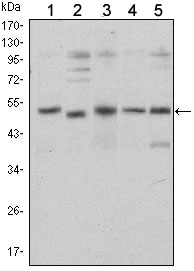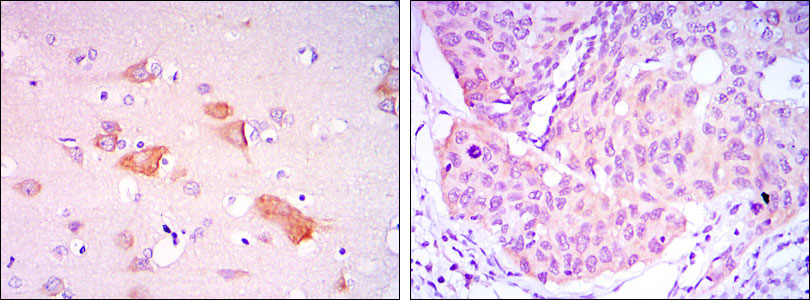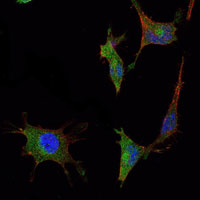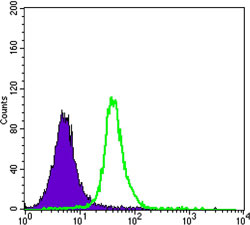SMAD5 Antibody
Purified Mouse Monoclonal Antibody
- SPECIFICATION
- CITATIONS
- PROTOCOLS
- BACKGROUND

Application
| WB, IHC, FC, ICC, E |
|---|---|
| Primary Accession | Q99717 |
| Reactivity | Human, Rat |
| Host | Mouse |
| Clonality | Monoclonal |
| Clone Names | 3H9 |
| Isotype | IgG1 |
| Calculated MW | 52kDa |
| Description | Transcriptional modulator activated by BMP (bone morphogenetic proteins) type 1 receptor kinase. SMAD5 is a receptor-regulated SMAD (R-SMAD). SMAD5 is required for normal development of the cardiovascular system in vivo; lack of the SMAD5 gene results in apoptosis of cardiac myocytes. 3 Upregulation of SMAD5 has been reported to mediate apoptosis of gastric epithelial cells induced by Helicobacter pylori infection. Tissue specificity: Ubiquitous. |
| Immunogen | Purified recombinant fragment of human SMAD5 expressed in E. Coli. |
| Formulation | Ascitic fluid containing 0.03% sodium azide. |
| Gene ID | 4090 |
|---|---|
| Other Names | Mothers against decapentaplegic homolog 5, MAD homolog 5, Mothers against DPP homolog 5, JV5-1, SMAD family member 5, SMAD 5, Smad5, hSmad5, SMAD5, MADH5 |
| Dilution | WB~~1/500 - 1/2000 IHC~~1/200 - 1/1000 IF~~1/200 - 1/1000 FC~~1/200 - 1/400 |
| Storage | Maintain refrigerated at 2-8°C for up to 6 months. For long term storage store at -20°C in small aliquots to prevent freeze-thaw cycles. |
| Precautions | SMAD5 Antibody is for research use only and not for use in diagnostic or therapeutic procedures. |
| Name | SMAD5 |
|---|---|
| Synonyms | MADH5 |
| Function | Transcriptional regulator that plays a role in various cellular processes including embryonic development, cell differentiation, angiogenesis and tissue homeostasis (PubMed:16516194, PubMed:12064918). Upon BMP ligand binding to their receptors at the cell surface, is phosphorylated by activated type I BMP receptors (BMPRIs) and associates with SMAD4 to form an heteromeric complex which translocates into the nucleus acting as transcription factor (PubMed:9442019). In turn, the hetero-trimeric complex recognizes cis- regulatory elements containing Smad Binding Elements (SBEs) to modulate the outcome of the signaling network (PubMed:33510867). Non- phosphorylated SMAD5 has a cytoplasmic role in energy metabolism regulation by promoting mitochondrial respiration and glycolysis in response to cytoplasmic pH changes (PubMed:28675158). Mechanistically, interacts with hexokinase 1/HK1 and thereby accelerates glycolysis (PubMed:28675158). |
| Cellular Location | Cytoplasm. Nucleus Mitochondrion. Note=Cytoplasmic in the absence of ligand. Migrates to the nucleus when complexed with SMAD4 |
| Tissue Location | Ubiquitous. |

Thousands of laboratories across the world have published research that depended on the performance of antibodies from Abcepta to advance their research. Check out links to articles that cite our products in major peer-reviewed journals, organized by research category.
info@abcepta.com, and receive a free "I Love Antibodies" mug.
Provided below are standard protocols that you may find useful for product applications.
References
1. Proc Natl Acad Sci U S A. 2008 Mar 11;105(10):3927-32. 2. Nat Cell Biol. 2008 May;10(5):567-74.
If you have used an Abcepta product and would like to share how it has performed, please click on the "Submit Review" button and provide the requested information. Our staff will examine and post your review and contact you if needed.
If you have any additional inquiries please email technical services at tech@abcepta.com.













 Foundational characteristics of cancer include proliferation, angiogenesis, migration, evasion of apoptosis, and cellular immortality. Find key markers for these cellular processes and antibodies to detect them.
Foundational characteristics of cancer include proliferation, angiogenesis, migration, evasion of apoptosis, and cellular immortality. Find key markers for these cellular processes and antibodies to detect them. The SUMOplot™ Analysis Program predicts and scores sumoylation sites in your protein. SUMOylation is a post-translational modification involved in various cellular processes, such as nuclear-cytosolic transport, transcriptional regulation, apoptosis, protein stability, response to stress, and progression through the cell cycle.
The SUMOplot™ Analysis Program predicts and scores sumoylation sites in your protein. SUMOylation is a post-translational modification involved in various cellular processes, such as nuclear-cytosolic transport, transcriptional regulation, apoptosis, protein stability, response to stress, and progression through the cell cycle. The Autophagy Receptor Motif Plotter predicts and scores autophagy receptor binding sites in your protein. Identifying proteins connected to this pathway is critical to understanding the role of autophagy in physiological as well as pathological processes such as development, differentiation, neurodegenerative diseases, stress, infection, and cancer.
The Autophagy Receptor Motif Plotter predicts and scores autophagy receptor binding sites in your protein. Identifying proteins connected to this pathway is critical to understanding the role of autophagy in physiological as well as pathological processes such as development, differentiation, neurodegenerative diseases, stress, infection, and cancer.





